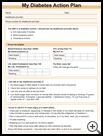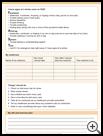
Ketone Testing
_______________________________________________________________________
KEY POINTS
- Ketone testing uses samples of blood or urine to measure ketones, which are chemicals the body makes when it burns fat instead of sugar for energy. When ketones build up to dangerous levels, it can cause coma or death if not treated right away.
- You can do the tests at home with kits bought at the drugstore. The blood ketone test tells you what the ketone level is at the moment you do the test. The urine ketone test shows what the ketone level was a few hours earlier.
- Follow your healthcare provider’s recommendations for reporting urine or blood ketone test results.
________________________________________________________________________
What is ketone testing?
Ketone testing uses samples of blood or urine to measure ketones, which are chemicals the body makes when your body burns fat for energy.
If your body does not make enough insulin, sugar cannot move out of your blood and into your cells. Your blood sugar can get very high and your body burns fat instead of sugar for energy. This makes byproducts called ketones. When ketones build up to dangerous levels, it is called ketoacidosis. This can cause coma or death if not treated right away. Ketoacidosis may happen with type 1 diabetes. It rarely happens with type 2 diabetes.
Why is it done?
Your provider may recommend that you check for ketones if:
- Your blood sugar level is higher than your healthcare provider recommends.
- You are sick or under more stress than usual. When you are sick, you can have ketones even if your blood sugar is not high.
How do I prepare for this test?
You can do the tests at home with kits bought at the drugstore. You can test the urine or blood for ketones. The blood ketone measurement tells you what the ketone level is at the moment you do the test. The urine ketone test shows what the ketone level was a few hours earlier.
Make sure you have a ketone test kit available to use at all times in case you get sick or have had recent changes in your medicines.
How is the test done?
Urine Tests
You can use urine test strips to check for ketones in urine. Ask your pharmacist about the types of urine ketone strips that are available.
Carefully follow the package directions for testing. Urine ketone tests must be timed exactly using a watch or clock with a secondhand. After you dip the strip in the urine sample, compare the color of the test strip with the colors in the chart on the container to see how high your ketones are. Ask someone else to watch the timing of the test with you and to check your reading of the strip. This helps prevent errors.
Blood Tests
To check for ketones in the blood you need a meter and blood ketone strips. Your healthcare provider can show you how to use the meter.
What does the test result mean?
Some of the reasons ketones may be higher than normal are:
- Your blood sugar is too high.
- You have too little carbohydrate (starch) in your diet.
- You have gone too long without eating.
Urine ketone test results can be affected by some medicines. Make sure your healthcare provider knows about all of the medicines you are taking.
Follow your healthcare provider’s recommendations for reporting urine or blood ketone test results. This is a very important part of getting your diabetes under control.
What if my test result is not normal?
If you have diabetes and are sick, and your urine test shows trace amounts of ketones, ketones may be starting to build up. Follow your sick day plan and your healthcare provider’s instructions.
If the urine test shows moderate or high levels of ketones, even if you are not sick, call your healthcare provider right away (day or night). Ketones may build up to dangerous levels.
Test results are only one part of a larger picture that takes into account your medical history and current health. Sometimes a test needs to be repeated to check the first result. Talk to your healthcare provider about ketone tests and ask questions, such as:
- If you need more tests
- What kind of treatment you might need
- What lifestyle, diet, or other changes you might need to make


